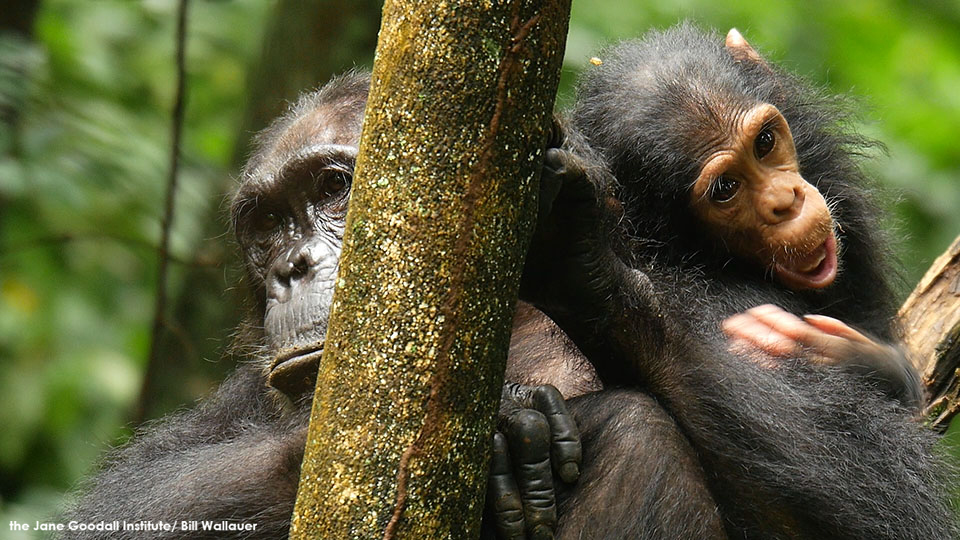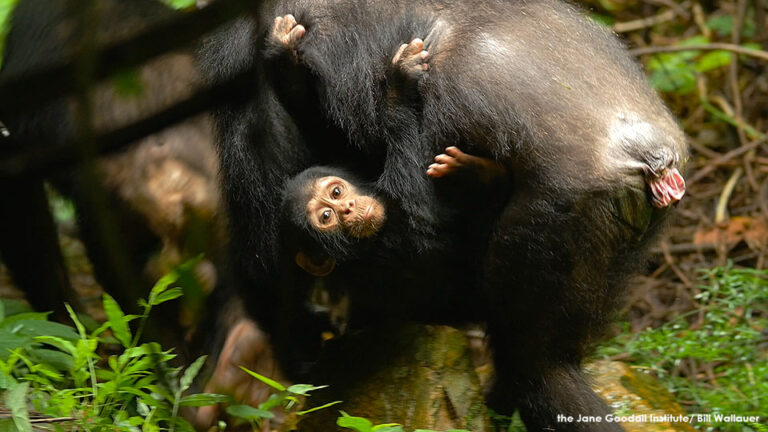Genetically, chimpanzees and humans share 98.6% of our DNA, and our behaviors are more than a little alike as well. 60 years ago, our previous understanding of our relationship to the rest of the animal kingdom was forever redefined by the one and only Dr. Goodall. Since 1960, research in Gombe, Tanzania has been evolving and growing, much like our two chimpanzee and human lineages from their early shared branch. Insights from Gombe help us to better understand ourselves, what is ancient versus what is unique in primates, as well as to reveal our similarities with the rest of animalkind.
The following studies showcase the extraordinary chimpanzee research which continues to this day. There’s plenty to discover – are you curious?
Chimp Females Who Leave Home Postpone Parenthood
Recently, researchers at Duke University, as a part of the Jane Goodall Institute Research Center, analyzed over 50 years’ worth of daily records for 36 female chimps born in Gombe National Park, through the robust database which goes all the way back to Jane’s findings penned in her famous notebook. This analysis enabled researchers to see across time and uncover trends, which allowed them to find one surprising pattern in particular: female chimps who depart from their birth family delay pregnancy and developing families of their own.
Chimpanzees live in groups with a structured hierarchy. In these groups, females can either remain with the group they’re born into, or head out on their own, likely to reduce incidences of inbreeding. This research demonstrated that for a young female chimpanzee looking to find her own way with a new group, her first pregnancy won’t happen until around the age of 16, whereas those who stay at home are moms at around age 13.
There are several reasons for this, including that chimpanzee who remain receive ongoing support (which also means more access to food if their own mothers are high ranking). Additionally, there is a tough integration period for those who forge their own path with a novel social community. Overall results from the study demonstrate how similar we are to chimpanzees in general, particularly with long development from child to adult. Yet, the question remains: As a female chimpanzee, would you stay or would you go now?
Meat Eating as Observed in Wild Chimpanzees
One of the wildest findings of Dr. Goodall, which established an entirely different lens through which we see our closest living relatives, is evidence of meat eating and hunting in chimpanzees. Previously thought to be herbivores (eating only plants), Jane rewrote our understanding of chimpanzee diets observing them as omnivores (eating both plants and animal protein). Since her initial observations, researchers have witnessed chimpanzees hunting and eating a variety of vertebrates, and in very rare cases, demonstrating cannibalism. Now, researchers want to better understand the meat eating compulsion in chimpanzees, as they are still predominantly herbivores. So, things got a bit messy.
 Researchers filmed 29 arboreal monkeys as they were consumed by chimpanzees at Gombe National Park, Tanzania, and recorded the order in which areas of the monkeys were consumed. The chimpanzees generally consumed the heads of infants first, 91% were consumed this way, while adult monkeys were generally consumed torso first. The scientists suggest this has to do with physiological barriers: infant skulls are less developed and thus easier to break, while adult skulls introduce a challenge and their torsos contain a “fat-rich liver.”
Researchers filmed 29 arboreal monkeys as they were consumed by chimpanzees at Gombe National Park, Tanzania, and recorded the order in which areas of the monkeys were consumed. The chimpanzees generally consumed the heads of infants first, 91% were consumed this way, while adult monkeys were generally consumed torso first. The scientists suggest this has to do with physiological barriers: infant skulls are less developed and thus easier to break, while adult skulls introduce a challenge and their torsos contain a “fat-rich liver.”
The findings give proper direction which could provide answers when it comes to the nutritional value of various organs, as well as inquiries around the overall benefit and/or necessity of meat eating in primates.
Lethal outbreak Among Wild Chimpanzees in Uganda Caused by Human “cold” Virus
In 2013, five chimps in a community of 56 in Kibale National Park, Uganda, died with little explanation. Researchers observed “severe fits of coughing and sneezing” in the chimpanzees prior to the incident and decided to investigate. Though no intervention could be made at the time, luckily, a vet on the scene was able to obtain samples postmortem to reveal what was going on. The chimpanzees were stricken with Rhinovirus C, a variation of the human “common cold”, which was only discovered in 2010. The strain affects children mostly, usually as a precursor to asthma.
It was surprising to find it in chimpanzees, and it was equally surprising that it could kill healthy chimpanzees outright. – Tony Goldberg, University of Wisconsin-Madison’s School of Veterinary Medicine
To understand why non-human great apes are susceptible to this virus, which was previously thought to only affect humans, researchers genotyped 41 chimpanzees. This told a very specific story: this particular group of chimpanzees have universal homozygosity of cadherin-related family member 3 CDHR3-Y529 allele. This means they have two of the same gene, one from each parent, making it dominant. This particular allele increases risk for Rhinovirus C infection, and asthma in human children. Thus, though our similarities to chimpanzees are wonderfully fascinating, they can also be deadly. Read more about what is being done to protect against zoonotic disease spillover events and why understanding the transmission of disease between wildlife and humans is so important, here.
To learn more about our ongoing groundbreaking research, visit here.

The Jane Goodall Institute is a global community conservation organization that advances the vision and work of Dr. Jane Goodall. By protecting chimpanzees and inspiring people to conserve the natural world we all share, we improve the lives of people, animals and the environment. Everything is connected—everyone can make a difference.






